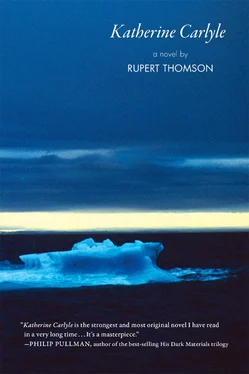“How old is this place?” he asks the man who is leaning against the shelves.
The man surveys him, the glitter in his eyes reptilian and cold, then he turns and speaks to the other man, who might or might not be his brother. He fails to answer my father’s question. Probably he didn’t understand.
My father doesn’t pursue it. Looking round, he finds himself drawn to the left side of the room, and then to one snow globe in particular. Inside the plastic dome is a replica of the airport where he and Lydia landed the day before, every detail faithfully re-created. The long low terminal building. The blue-and-white light aircraft mounted on a pedestal outside and placed, bizarrely, in among some birch trees. The chunky pale-pink control tower. Tiny passengers thread their way across the tarmac towards an old-fashioned turboprop that is preparing for takeoff. My father is about to call out to Lydia when he sees something that almost stops his heart. At the top of the steps that lead up to the plane is the figure of a young woman with hip-length hair. Dressed in a dark-brown coat, she glances over her shoulder, taking one last look at the place she is about to leave behind. The air between my father’s eyes and the plastic dome seems to contract, congeal.
“David?” Lydia says. “What is it?”
He doesn’t reply. Instead, he snatches up the snow globe and carries it over to the man sitting by the counter. He points at the inside of the dome.
“This girl,” he says. “Have you seen her?”
The man looks past my father at the other man, and his lips draw back to reveal receding gums.
My father pushes the snow globe up against the man’s face, too close to focus on. “You’ve seen her, haven’t you. Where did she go?”
Lydia touches my father’s arm. “He doesn’t understand, David. He doesn’t know what you’re talking about.”
He shakes her off. The man does understand. Both the men understand. He’s convinced of it. They’re communicating, all three of them, at a level beyond language.
“Tell me where she is,” he says, “or I’ll call the police.” He searches for the word in Russian. “Militsaya.” He seizes the man by his lapels, hauls him to his feet and shouts into his face. “Militsaya!”
The man begins to shake, as if he has a fever — he’s shaking all over — then he opens his mouth, showing all his teeth, some of which are thin as matchsticks, and he’s shouting too, in a high-pitched voice, like a bird.
Lydia steps back into the shadows. She’s used to thinking of herself as practical, efficient, but the situation frightens her. She has no idea what to do.
The snow globe slips from my father’s hand and smashes on the floor.
Everything stops.
My father lets go of the man, who slumps back in his chair. The man’s chin rests on his chest, and he’s panting. His hair has fallen over his eyes. It occurs to my father that the man might be a cripple, or an epileptic. Or even mentally deficient. The other man leans down and straightens his brother’s clothes, then whispers in his ear. There’s a thin acrid smell, like blown lightbulbs or melted fuse wire. Lydia still hasn’t moved.
The man in the chair is saying something in Russian. The same words, over and over. This time it’s my father who doesn’t understand. The man reaches for a pencil and paper. With a trembling hand he begins to scribble.
It’s a number.
A price.
He says the words again, then aims a finger at the shattered globe. He seems to be pointing at the tiny figure in the cashmere coat. She is still poised at the top of the metal staircase, still glancing nostalgically over her shoulder, but the plane has lost a wing, and the airport is in pieces, and the granules of snow are scattered across the dark wood floor.
As my father stares at the broken globe, the man comes out with a simple quiet sentence. My father doesn’t know what the man is saying. I do, though. I know exactly what he’s saying.
If you don’t pay, your daughter will die .
/
A few nights later I rise up slowly through several layers of sleep. My feet are so cold they feel separate from the rest of me. The clock says twenty to three. A symphony is playing on the radio. Stealthy apprehensive music. Feelings that aren’t permitted. A cleansing wash of sound from the strings, but then anxiety and turbulence from the brass instruments. I turn the volume down and listen. There are no noises in the corridor, not tonight. Bohdan is in Pyramiden, perhaps. Once I have rubbed some warmth into my feet I leave the bed and walk to the window. I never tire of looking out at this unlikely place; I still marvel at the fact that I am here. The smooth white sports field, spotlights casting soft-edged circles on the snow. Buildings that seem unnaturally motionless, as if braced against the cold. One of the older houses sinks, lopsided, into the earth. To the left and lower down, not far from the old canteen, is the wooden church with its blunt black spire. The lights have been left on, and the two windows glow, sinister as the eyes in a Halloween pumpkin.
I’m about to turn away when a shift in the shadows to my right distracts me. A polar bear shambles down the slope, moving like an athlete, with a loose easy muscularity, its coat a musty yellow white. The breath stalls in my throat. Once on level ground, the animal rears up on its hind legs. Head swaying on its powerful neck, it lifts its muzzle and sniffs and scours at the air. Then it drops lightly back on all fours and disappears into the darkness beyond the football pitch, and I’m left standing at the window, buds opening inside my body, a tingling on the surface of my skin. Torgrim told me that polar bears do most of their hunting on drift ice. From April onwards, though, the ice begins to melt. Polar bears can survive without eating for eight months, but they are so hungry by late autumn that they will go almost anywhere in search of food. All the same, I can’t quite believe what I’ve seen. Back in bed I reach for the radio and turn the volume up again. The symphony isn’t over yet. The music has an insistent rhythmic quality — risks are being taken, avenues explored — and I lie awake until it finishes.
When I walk into the library the following morning Zhenya’s eyes are swollen and I suspect she has been crying. I ask if she’s all right. She shrugs and doesn’t answer. Later, over a cup of dark sweet tea, she tells me that she and Gleb had an argument the previous night, and that she couldn’t sleep for hours afterwards. It was about money, and about their son. She wants to return to Ukraine but Gleb thinks they should stay on, perhaps beyond the summer. He claims it would be an investment in the future. If you don’t have a present, she told him, there isn’t any future. After that he said cruel things, hateful things. He’d been drinking, of course.
“It’s hard to be in this place.” Zhenya gives me a direct, almost accusing look. “Sometimes I don’t understand why you are here.”
“I don’t have a husband,” I say, “or any children either. I’m free to go where I want.”
“You have no boyfriend?”
“There was someone.” I sigh, then look away. “It’s over now.”
“Your heart is broken? That is why you came?”
“No, no. Nothing like that.”
Zhenya’s eyes are still fixed on me. “Strange you have no boyfriend,” she says, “a girl who looks like you.”
Outside, the darkness is absolute, even though it’s the middle of the day. It has been like this since November 12, when the last of the light disappeared. I pick at a loose thread on Mrs. Kovalenka’s sweater, then reach for my cup. The thin clean smell of tea.
“I can’t tell you why I’m here,” I say, “not now.” I hesitate. “Perhaps if I get to know you better.” And then, in an attempt to lighten the mood: “If you stay for long enough.”
Читать дальше












